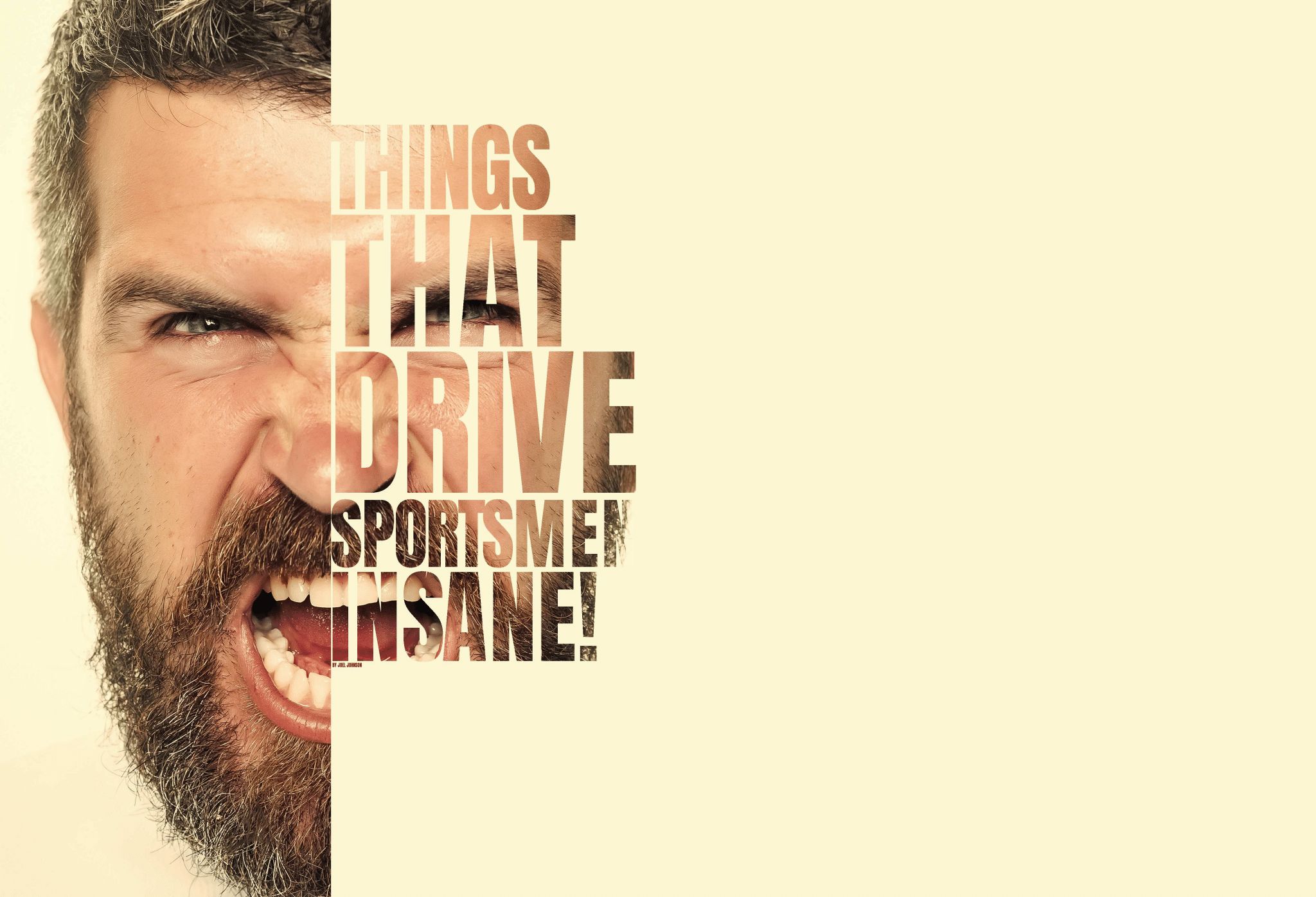Things that Drive Sportsmen Insane

Things that Drive Sportsmen Insane
Iowa Sportsmen are generally a cheerful, dedicated, and passionate bunch. However, some things get under the skin (literally!) of even the most positive hunters and anglers. Following is a list of what drives me crazy in the woods and on the water, and I am certain the majority of you will relate.
Mistaking squirrel sounds for deer movement
TAfter 20+ years of bowhunting, you’d think I’d know the difference between squirrel sounds and deer moving through the timber. I don’t know if its buck fever or simple immaturity, but every season I’m fooled into thinking a Pope and Young buck is approaching by the sound of squirrels bouncing around in the leaves.
Bugs!
More specifically the axis of evil- ticks, mosquitos, black flies, and chiggers. I can go without food, water, and even blue-labels for some time without complaining. However, these creepy crawly degenerates can put me in the red immediately! The worst part is once you see one or get bitten, your mind plays tricks on you for hours or days; convincing you that a tick is tickling the inside of your ear or ‘skeeters are circling your bed at night.
Animals destroying tree stand cushions
Have you ever left a tree stand seat and shooting rail cushion on your stand all season? If not, don’t ever do it…..ever! I’m certain the legions of militant squirrels and raccoons from western Iowa have spread throughout the state and beyond; wreaking havoc on hunters stands across the nation! Make the same mistake I’ve made, and that warm butt insulator will be reduced to ribbons the next time you think it’s safe to leave it in the woods.
Forgetting the deer cart or sled
The day finally arrived- cold, snowy, and full of promise for a late season muzzleloader hunt. You trudged a mile through the snow and wind chill to intercept the buck on his way to feed. Your shot was true, and as you admired the stunning mass and points in the fading light you realized you’re going to have to drag this deer all the way back to your truck.
Cutting shooting lanes too small or too big
Have you ever had to let a monster buck walk because a limb or branch was in the way? Ever have a hit list stud or magnum doe bust you because you didn’t leave enough cover? I’ve experienced both more times than I’d like to remember. Pro tip- clear your shooting lanes wide enough for unobstructed angles and shots without exposing your movements.
Forgetting the bowstring release aid
The development of release aids for bow hunters revolutionized accuracy and consistency. Unfortunately, a majority of archers are completely dependent on these devices and some have never loosed an arrow with their fingers. There are few things that cause me to erupt in self-loathing more than getting set up in “the” tree on November 10th only to realize I forgot my release. Word to the wise- always pack a spare in your backpack.
Ground blinds that blow away
You spent hundreds of dollars on the best ground blind on the market. After unpacking and setting it up in a perfect location, brushing it in and completely concealing it from wary deer and turkeys. You weren’t impressed with the skinny coat hanger-like stakes that came with the blind, which cost a small fortune, but figured, “…hey, they must be good enough or it would have come with something bigger…”
On the opening day of turkey season, you creep through the pasture in the dark only to find your blind isn’t where you left it. All your head lamp can find is ragged holes in the ground and drag marks where something, or someone, ripped your investment from the dirt. You think to yourself, “…the wind didn’t blow THAT hard last night… Did it?” Then the sweeping beam of your light reveals the carnage. The once proud blind is unrecognizable- wrapped and ripped unrepairable in the downwind barbed wire fence; flapping pathetically in the April breeze. High wind stakes cost less than $10 at Wally World.
Food plots that don’t produce
I’ve experimented with food plots for the last several years with mixed results. I follow the checklist meticulously- test the soil, apply the fertilizer, work the ground, and sow the seed. Voila, instant food plot success, right? Unfortunately, it’s not that simple… Hundreds of dollars and man hours do not guarantee you will have successful food plots.
Poorly trained bird dogs
In my 35+ years in the outdoors, nothing has caused me more heartburn, sore throats, lost voices, or genuine anger than poorly trained bird dogs. Don’t get me wrong, I never blame the dogs themselves as their performance is 100% the responsibility of the owner. However, my group of friends have had it so bad at times that we’ve had to draw straws to determine who was going to yell at the dog; saving the voices of other hunters for the next day. I don’t care how much money you spent on a pup, who trained it, or what its pedigree looks like. If it won’t heel or come when calling it, leave the poor animal at home!
Trespassers!
Nothing makes my blood boil more than the worthless, pathetic, no-good degenerates that knowingly trespass on others’ land. Trespassing is the epitome of selfishness and laziness and is the bain of sportsmen the world over. If you or your friends don’t have firsthand verbal or written permission for a piece of ground, keep out! Don’t trust peoples’ assumptions about this or that landowners’ feelings about your hunting their land or fishing their pond. This is a recipe for disaster, a butt-chewing, or worst of all an expensive ticket.
Cedar trees and thistles
Anybody who owns or manages CRP ground understands that cedars and thistles are the gift that keeps on giving all year long. You can burn them, spray them, and mow them, and somehow they’re able to come back every year. Left unchecked, these invasive species reduce the value and quality of habitat and can easily infiltrate and displace acres of previously productive grasslands.
“Horn” hunters passing judgment
Every deer hunter I know dreams of shooting a trophy. The problem is that the definition of a “trophy” is very subjective. A trophy can be seen through many different lenses, and horn size isn’t the only benchmark. A weekend warrior that has limited time and access to public land only, a trophy deer could be the first one that passes within shooting range.
For a subsistence hunter, a trophy deer is likely the largest bodied deer in a herd that will fill the freezer. For someone fortunate to have permission on private land or the financial means to pay an outfitter, a trophy is most often the buck with the biggest rack on the farm. No matter which definition you subscribe to, don’t pass judgment on the harvests of others. Nobody appreciates the guy that consistently says, “…man, that deer would a been nice in a couple years…” while you are trying to admire the biggest buck or doe you’ve ever harvested.
The majority of today’s outdoor programming
For the average person channel surfing, some of today’s outdoor hunting shows must be a bad joke. In a 30 minute segment, there may be 5 minutes dedicated to actual hunting footage with the balance spent marketing products and gadgets for sponsors. To make matters worse, when an animal is actually killed, it is often treated with indifference while the “celebrity” hunters high five and chest bump over the carcass. This low rent footage provides endless fodder for anti-hunting organizations, enabling them to paint all hunters with broad strokes as blood-thirsty, redneck, murderers, bent on the exploitation of animals. For those looking for a respite from these formats, check out a show called “Meateater”.
I’ve watched several episodes and am pleasantly surprised with the host’s approach. What I appreciate the most is that in more than 10 shows he hasn’t done a single product spotlight or marketing piece for any sponsor. The trained eye can identify his preferred brands of firearm, outerwear, and cooler, but there are no explicit endorsements. The episodes are filled with outdoor content from exquisite locations, and most often the hunts are DIY on public lands. Most importantly, the hosts display genuine appreciation for the opportunities and reverence for the animals, novel concepts that have been lost by some sportsmen.
Over-friendly fishermen
Maybe it’s just an Iowa thing or the way I was raised, but when you’re on the water there should be a concept of personal space. I know in Minnesota and even on the Iowa Great Lakes the boats can sometimes be so close you can bait your neighbors’ hooks. However, I try to follow the golden rule when my family is on the water. When we locate a hot bite, I don’t appreciate it when other anglers crowd around us for a piece of the action. I cherish this time with my wife and daughters, and copying or homing in on our location is just plain lazy. I don’t hijack others when they’re catching fish and expect the same courtesy in return. Maybe I’m just old school…
Bass and musky guys…
As a rule, I don’t disparage other sportsmen without good cause. We’re all on the same team and should always try to lift each other up. However, there is just something about some of the bass and musky guys trolling the internet and popular fishing apps. Their self-righteous and sanctimonious attitudes towards these fish species and anglers that don’t revere them with the same amount of passion is maddening. My family doesn’t bass fish, and we treat them as bycatch when targeting panfish and walleyes; releasing the lot.
As a biologist and angler I understand and appreciate apex predators and the role they serve. However, bad mouthing and abusing folks that keep a bass or two for the dinner table, when they are following the regulations, is ignorant and rude. Similarly, tearing down folks that accidentally catch a musky and don’t handle it “properly” or treat it with little kids’ gloves is annoying. Just because a teenager catches a trophy bass or musky on a nightcrawler and bobber doesn’t mean all those gigantic lures in your tackle box are a waste of money.
Boat control on windy days
It never fails. You plan a fishing trip to your favorite honey hole expecting light winds and when you arrive it’s blowing 15 and gusting 25 or more. Un-phased, you back your boat into the water and head for a brush pile or gravel bar. After a few minutes of searching you locate the fish and the bite is amazing! Unfortunately, at the same time the wind starts gusting to 35, rendering your electronic and traditional anchors powerless to stay on the coordinates. A patient man may be able to control his emotions and go with the flow. In my experience, no matter how hot the bite may be, the stress and strain of trying to keep the boat on point makes me wish we’d stayed at home.
Line twists, loops, and birds’ nests on fishing reels
Part of my springtime routine is to replace the line on all our reels, and I learned a long time ago that less is more. Avoid the urge to fill your spools completely and you will save yourself significant pain and suffering. When spools are too full, it tends to roll off the front of the reel creating slack, twists, and loops. This is amplified on windy days or when casting into the wind. The same can happen on bait casting reels, and it can be devastating.
Every novice using a bait caster has an experience with a back cast or “backlash” when reels do not have the correct configuration. Like black magic, loops are instantly deep within the spool, and casting can completely fail. Patient anglers have the ability to use a pick to meticulously remove the loops, let out line, and correct the situation. Others anglers, like myself, most often toss the rod back in the rod locker to deal with at a later date.
People that don’t know the difference between wake and no wake
Nothing is more irritating than being in position on a good bite and having another boat pass by too closely and too quickly in a no-wake area. For the uneducated, no wake means operating a boat at slow or idle speeds to prevent visible waves from being produced. This is a courtesy to other boaters and shore anglers in the area. Again, I follow the golden rule on this one when my family is on the water. Would I love to open up my Mercury and get to the next spot? Absolutely! However, I resist the urge to do so and respect other folks on the water.
Commercial worm bedding
What’s the deal with that disgusting black commercial worm bedding? Not only does it stain fingers and clothes, somehow it always ends up in every nook and cranny of your boat or smeared in the carpet. My family usually picks our own crawlers and stores them in buss bedding or similar. But in a pinch we sometimes have to buy the blue box brand at convenience stores or Wally World. I don’t know what they put in that black sludge, but they would likely sell a lot more if it wasn’t so messy.
Poor boat ramp etiquette
Now that open water season is heating up, many of you have probably experienced (or displayed) poor boat ramp etiquette. For my family, this includes folks that fish from boat ramp jetties, people who park on the edge or sides of boat ramps, and boaters that fail to complete rigging in the parking lot.
All of these issues make putting a boat in or out of the water more difficult. In addition, they inconvenience and generally add stress to an already stressful situation. If you’re catching fish from the boat launch, I certainly don’t want to mess you up, but if you could please move temporarily so people can put their boat in or take it out, I appreciate you in advance.
If people could refrain from parking directly on or around the entrance to boat ramps, it would reduce the risk of collisions and prevent a potential confrontation. When boaters remove tarps and straps before they get to the ramp it saves time for others that may be in line. If boaters wait to unload and situate equipment until they are out of the water and in the rigging lane or parking lot they don’t inconvenience others waiting to get out of the water.
Finally, if you are using a kayak, please don’t obstruct the ramp at the edge of the water. People backing trailers down the ramp may not see you or your equipment until it’s too late.
This list is by no means exhaustive, and I’m sure there are some obvious examples that I missed.
Summary
Nobody is perfect, and I certainly make my share of mistakes. As sportsmen we should treat each other with respect and set an example for others. Do your best to be patient and thoughtful when you’re in the woods or on the water. Think about how your actions or inaction may impact others and do your best to be a good person. If you have a good day on the water, share some intel with others so they can be successful as well. What comes around goes around and we could all use some good karma right now!
by Joel Johnson
August 2020
Check Out This Article on Habitats for Birds in Iowa –

